Recycle Mike's happy days 课件(49张PPT)
文档属性
| 名称 | Recycle Mike's happy days 课件(49张PPT) | 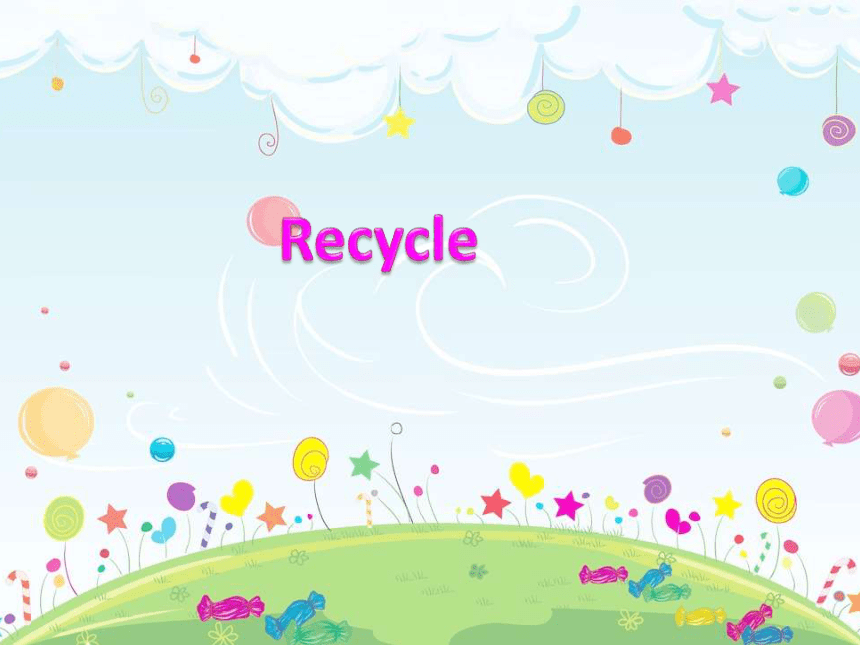 | |
| 格式 | zip | ||
| 文件大小 | 6.8MB | ||
| 资源类型 | 教案 | ||
| 版本资源 | 人教版(PEP) | ||
| 科目 | 英语 | ||
| 更新时间 | 2019-03-06 13:40:04 | ||
图片预览

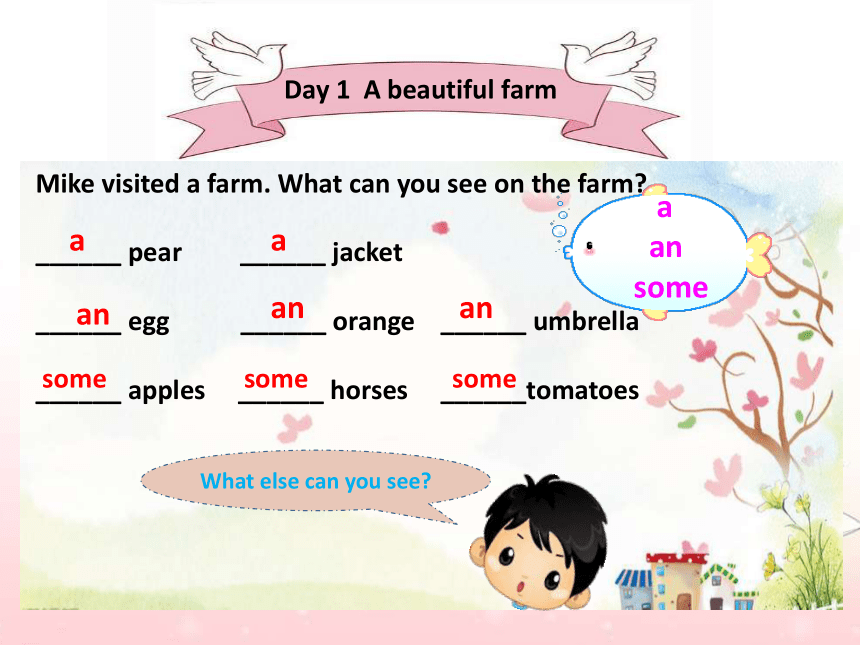
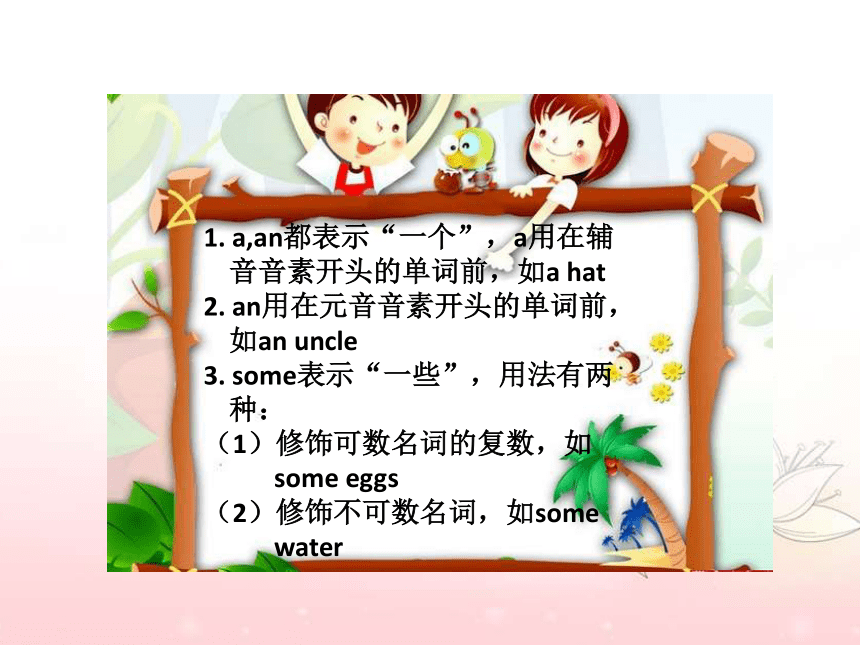
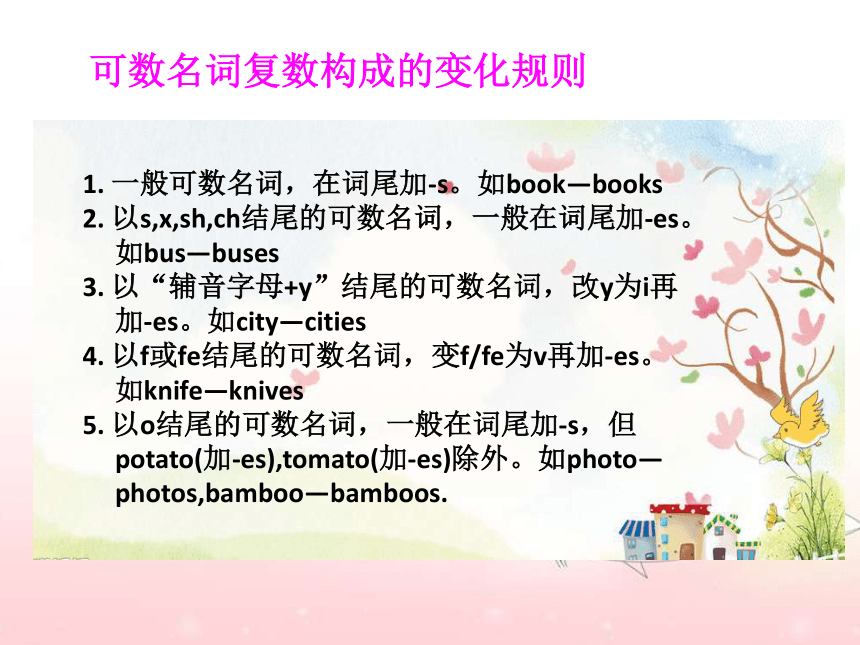
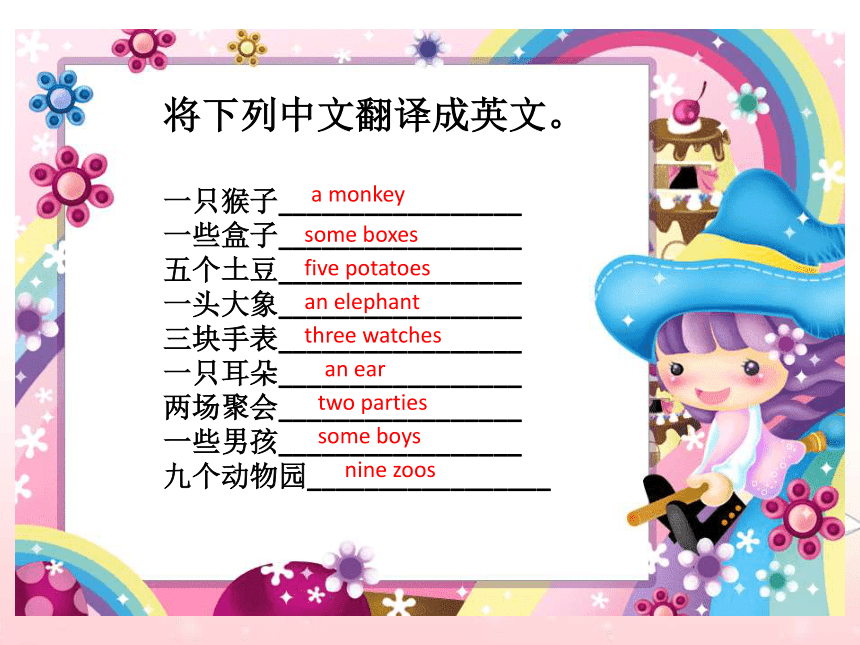
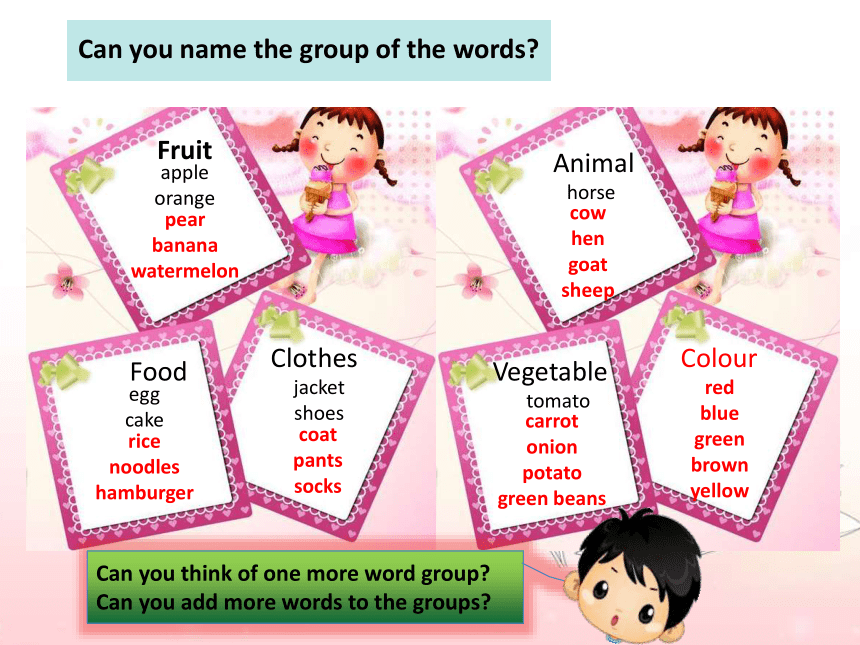
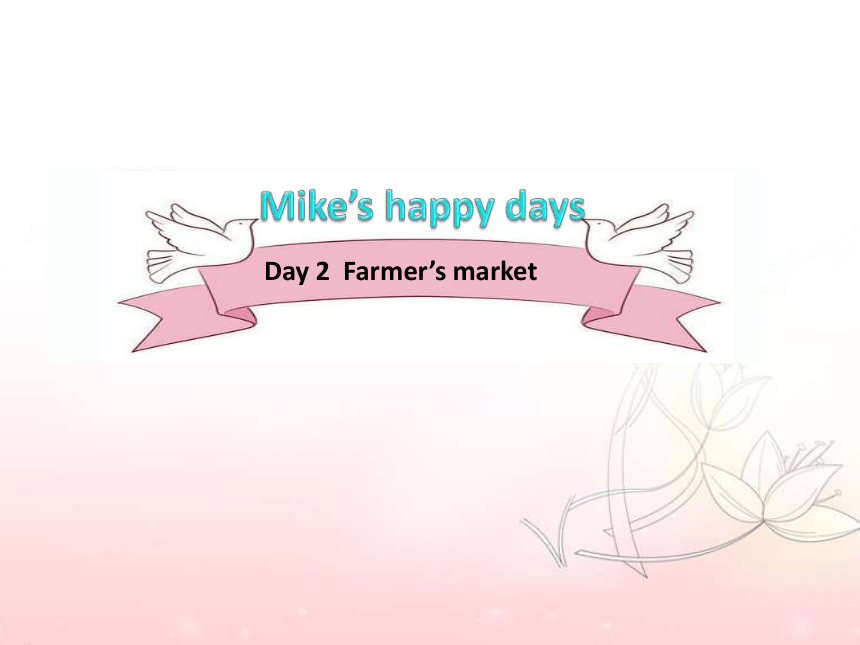
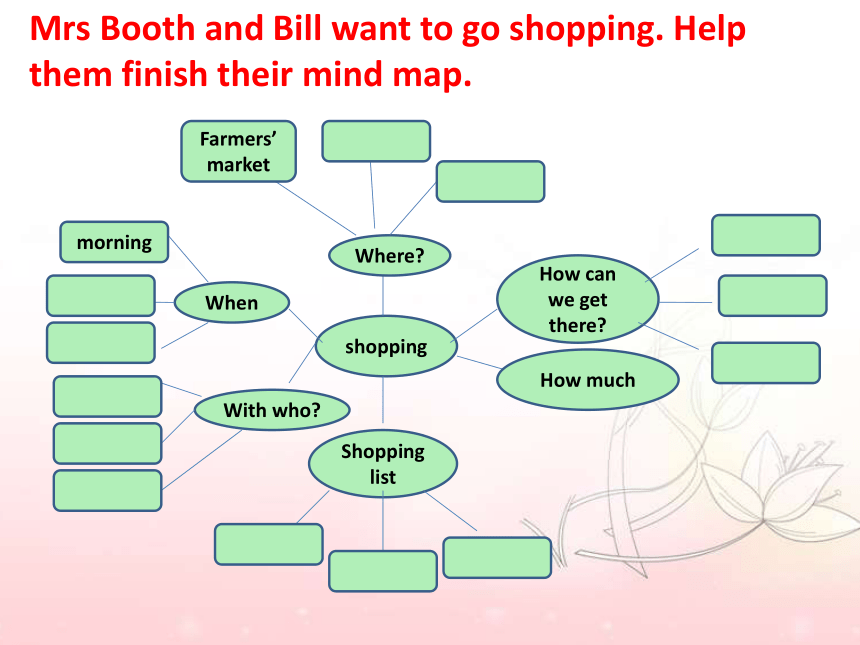
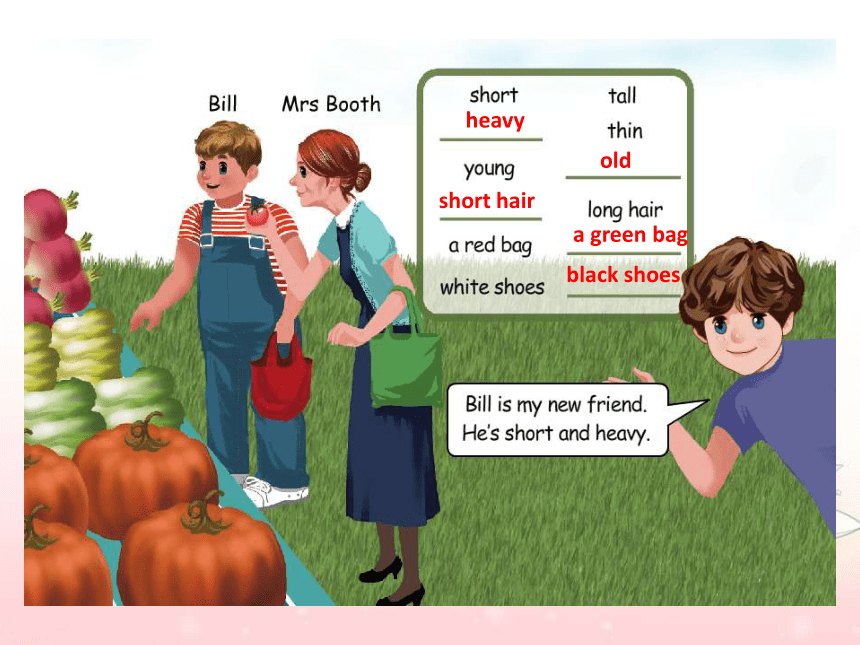
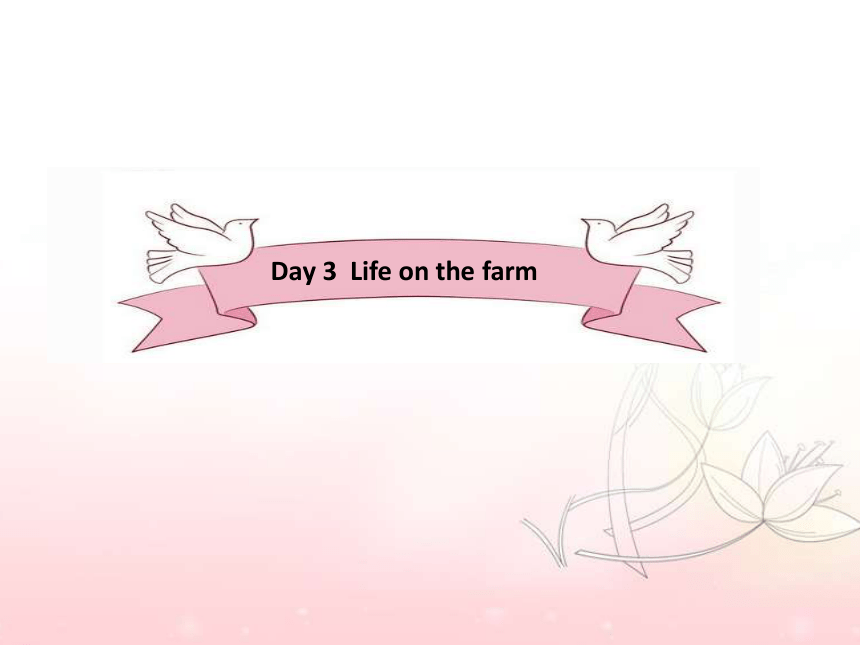
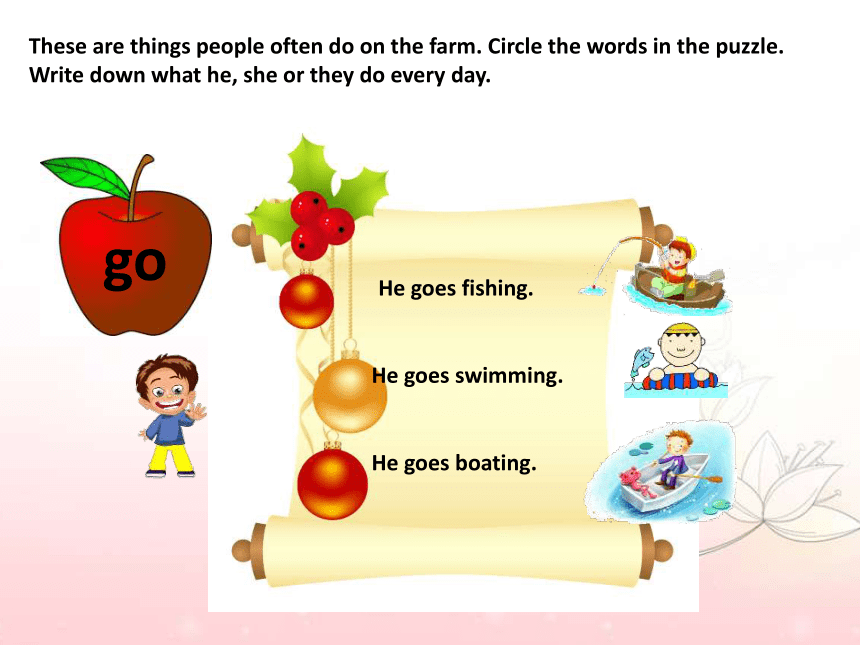
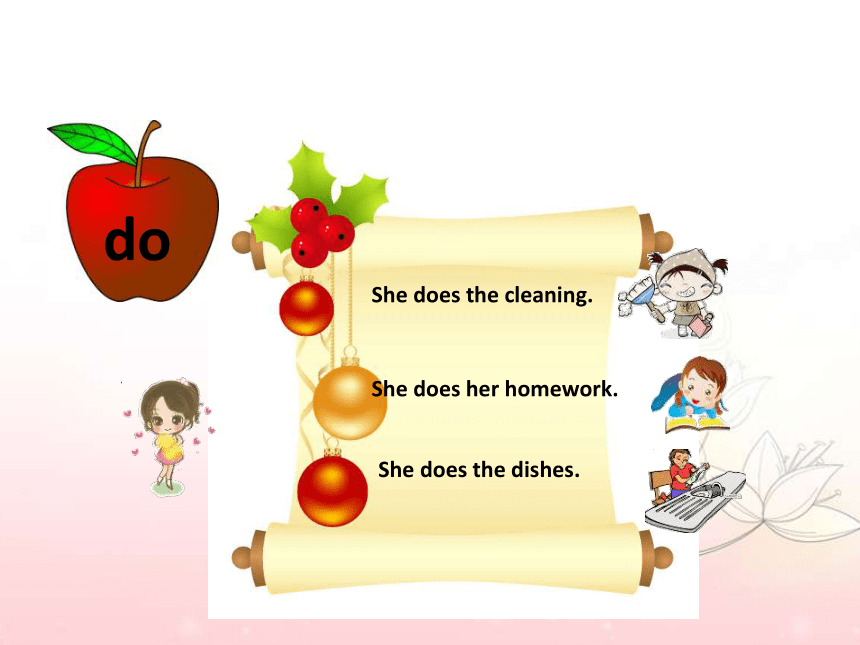
文档简介
课件49张PPT。RecycleDay 1 A beautiful farmMike visited a farm. What can you see on the farm?
______ pear ______ jacket
______ egg ______ orange ______ umbrella
______ apples ______ horses ______tomatoes
a
an
someWhat else can you see?aaananansomesomesome1. a,an都表示“一个”,a用在辅
音音素开头的单词前,如a hat
2. an用在元音音素开头的单词前,
如an uncle
3. some表示“一些”,用法有两
种:
(1)修饰可数名词的复数,如
some eggs
(2)修饰不可数名词,如some
water可数名词复数构成的变化规则1. 一般可数名词,在词尾加-s。如book—books
2. 以s,x,sh,ch结尾的可数名词,一般在词尾加-es。如bus—buses
3. 以“辅音字母+y”结尾的可数名词,改y为i再加-es。如city—cities
4. 以f或fe结尾的可数名词,变f/fe为v再加-es。如knife—knives
5. 以o结尾的可数名词,一般在词尾加-s,但potato(加-es),tomato(加-es)除外。如photo—photos,bamboo—bamboos.将下列中文翻译成英文。
一只猴子_________________
一些盒子_________________
五个土豆_________________
一头大象_________________
三块手表_________________
一只耳朵_________________
两场聚会_________________
一些男孩_________________
九个动物园_________________a monkeysome boxesfive potatoesan elephantthree watchesan eartwo partiessome boysnine zoosFruitapple
orangeFoodegg
cakeClothesjacket
shoesAnimalhorseVegetabletomatopear
banana
watermelonrice
noodles
hamburgercoat
pants
sockscow
hen
goat
sheepcarrot
onion
potato
green beansColourred
blue
green
brown
yellowCan you name the group of the words?Can you think of one more word group?
Can you add more words to the groups?Mike’s happy daysDay 2 Farmer’s marketshoppingWhenWith who?How can we get there?How muchWhere?Shopping listFarmers’ marketmorningMrs Booth and Bill want to go shopping. Help them finish their mind map.heavyshort hairolda green bagblack shoesDay 3 Life on the farmThese are things people often do on the farm. Circle the words in the puzzle. Write down what he, she or they do every day.He goes fishing.He goes swimming.He goes boating.godoShe does the cleaning.She does her homework.She does the dishes.playHe plays music.He plays ping-pong.He plays basketball.haveThey have some juice.They have fresh vegetables.They have art class.1.用法:一般现在时表示经常性或习惯性
的动作、现在的特征或状态。例如:
I get up at six every day.我每天六点起床。
He is nine years old.他九岁。
2.构成:
(1)主语+be动词+其他. 例如:
Lily is tall.莉莉很高。
His mother is happy.他的妈妈很高兴。
(2)第三人称单数主语+动词第三人称单数
形式+其他.例如:
Andy usually plays football on Sunday.安
迪通常星期天踢足球。
(3)其他人称主语+动词原形+其他.例如:
We water TV after dinner.我们晚饭后看
电视。
一般现在时3.句型变化:
A.否定句:
(1)主语+be动词+not+其他. 例如:
She is not a student.她不是学生。
(2)第三人称单数主语+doesn't+动词原形
+其他.例如: Tom doesn't like dogs.汤姆不喜欢狗。
(3)其他人称主语+don't+动词原形+其他.例如:
They don't have maths today.他们今天没有
数学课。
B.疑问句:
(1)Be动词+主语+其他? 例如:
Are you from China?你来自中国吗?
(2)Does+第三人称单数主语+动词原形+其他?
例如:
Does he go home on foot?他步行回家吗?
(3)Do+其他人称主语+动词原形+其他?例如:
Do they live here?他们住在这儿吗?
一、用所给单词的正确形式填空。
1.He ______(be) a doctor.
2.Mary ______(want) to visit her grandma next
weekend.
3.They ______(take) a walk after dinner every day.
二、按要求改写下列句子。
1.The dog feels sad.(改为一般疑问句)
_________________________
2.The rulers are mine.(改为否定句)
_________________________
iswantstakeDoes the dog feel sad?The rulers aren't mine.These people are having fun on the farm. Write down three sentences about what they are doing.Bill is playing ping-pong.Mike is painting.MikeShe is playing the pipa.They are having a picnic.现在进行时1.用法:表示现在某一时刻或某段时间正在
进行的动作或发生的事情。
2.结构:主语+be动词+动词-ing+其他.例如:
I am reading a book.我正在读书。
Linda is flying a kite.琳达正在放风筝。
现在分词的构成规则:
(1)一般情况下直接在词尾加-ing。例如:
do—doing play—playing
(2)以不发音的字母e结尾的动词,去e再
加-ing。例如:
make—making dance—dancing
(3)以重读闭音节结尾的动词,双写词尾
的辅音字母再加-ing。例如:
swim—swimming run—running
一、选择填空。
1.She ______ to music now.
A.listens B. listening C. is listening
2.They ______ in the river.
A.swims B. are swimming C.are swiming
二、看图,说说图中的人物正在做什么。
Day 4 Mike’s day on the farmWhat did Mike do on the farm?Saturday was a busy day for me.
In the morning, I got up early.
Then I ________________________.
After that, I ________________________.
Next, I ________________________.
In the afternoon, I ________________________.
In the evening, I __________________________.
Finally, I ____________________ at 10 p.m.had breakfastcleaned my roomwent fishingread a bookplayed computer gamesslept1. 概述:一般过去时表示在过去某个时间发生
的动作或存在的状态,也表示过去经常或反
复发生的动作。常与表示过去的时间状语连
用,如yesterday/last week等。
2.动词过去式的变化规律:
(1)一般情况下直接在词尾加-ed,如
call—called。
(2)以不发音的字母e结尾的动词,加-d,如
live—lived。
(3)以“辅音字母+y”结尾的动词,变y为i再加
-ed,如study—studied。
(4)以重读闭音节结尾,且末尾只有一个辅音
字母的动词,双写末尾的辅音字母再加-ed,
如stop—stopped。
(5)有些动词的过去式是不规则变化的,如
come—came,go—went,take—took等。一般过去时用所给词的适当形式填空。
1.My father ________(is) a pilot ten years
ago.
2.What ________(do) you do yesterday?
3.She ________(watch) TV last night.
4.Did your mother ________(go) to the
shopping centre this morning?
5. John ________(fly) a kite last Sunday.
wasdidwatchedgoflied1. Show one picture.Now read about Mike and Bill's game.3. Show the last picture.2. Get another picture, but don't turn it over.Bill: Guess! Is this bigger or smaller than the elephant?
Mike: I think it's bigger than the elephant.
Bill: No, it isn't. It's smaller. Look. It's a tiger.Bill:It's an elephant. It's big.Bill: Look. The other card is a whale.
Mike: So the whale is the biggest, and the tiger is the smallest.There are there pictures.Now read about Mike and Bill's game.There are there pictures.1. Show one picture.Bill:It's an elephant. It's big.2. Get another picture, but don't turn it over.Bill: Guess! Is this bigger or smaller than the elephant?
Mike: I think it's bigger than the elephant.
Bill: No, it isn't. It's smaller. Look. It's a tiger.3. Show the last picture.Bill: Look. The other card is a whale.
Mike: So the whale is the biggest, and the tiger is the smallest.1. 形容词比较级的句型:
A+be动词+形容词比较级+than+B.
用于两者间进行比较,表示“A比B……”。
例如:
He is taller than me.他比我高。
This bag is bigger than that one.这个包
比那个大。形容词或副词比较级的变化规则口诀:
原级变成比较级,er结尾要牢记;
一般情况直接加,单辅重闭双写加;
辅音加y双写加,以e结尾去e加;
少数部分双音节,规则如同单音节。
其余双音多音节,词前加more就可以,
不规则词没几个,它们需要特殊记。2.形容词最高级的句型:人/物+be动词
+the+形容词最高级+名词+表示范围的短
语或从句.
用于两个以上的人或物进行比较。
例如:
She is the tallest student in her class.她是她
班上个子最高的学生。
This is the biggest ball in the picture.这是这
幅图里最大的球。
形容词最高级的变化规则与比较级相似,区别是比较级以-er结尾,最高级以-est结尾并在前面加the。
注意:双音节和多音节形容词的最高级需在前面加most来构成。一、根据提示完成句子。
1.他是学校里最聪明的学生。(smart)
He is ___________________ in the school.
2.你的眼睛比我的大。(big)
Your eyes are ___________________.
3.我的妹妹比哥哥有趣。(interesting)
My sister is ___________________ my brother.
二、看图说一说。the smartest studentbigger than minemore interesting thanDay 5 Mike’s and his new friends: Part 1Mike’s PPT about his school life. I go to school from Monday to Friday. My favourite day is Monday.On Monday I have maths,English music and PE. I like PE best.Maths is my first class. I often answer maths questions. Sometimes they’re difficult.In English class, I read many English stories, and I like to speak English with my friends.I play the piano or sing songs in music class. This is very noisy and often great fun. In the afternoon I have PE class. I sometimes play football or exercise in the gym. I’m not good at running, but I like football best!Mike is my new friend…Bill told his friends about Mike. Read and underline the mistakes.1. Mike likes Monday best. His favourite class is English.
2. English is his first class on Monday. He reads many
English stories, and he likes to speak English with his
friends.
3. In the maths class, Mike often answers very difficult
maths questions.
4. In the PE class, Mike sometimes plays basketball or
exercise in the gym. He likes basketball best.1. I go to school from Monday to Friday.
从星期一到星期五我去上学。from… to… 意思是“从……到……”,可表示时间、地点、人物、事物等。
例如:
It’s a long way from Beijing to Guangzhou.
从北京到广州有很长一段路。
The work will take us from two to three hours.
这工作将要用去我们2至3小时的时间。2. I’m not good at running,but I like football
best.我不擅长跑步,但我最喜欢足球。(1)be good at“擅长……,在……方面做
得好”,后面可加名词或动词-ing形
式。 否定形式为be not good at“不
擅长”。
例如:
He is good at English.他擅长英语。
I’m not good at singing.我不擅长唱歌。
(2)like…best“最喜欢……”,相当于
favourite。
例如:
I like this book best.=This book is my
favourite.我最喜欢这本书。Day 6 Mike’s and his new friends: Part 2Look at Bill's poster in the textbook.
Read and tick or cross.
1.□Bill liked candy.
2.□Bill is taller than before.
3.□Bill will wear a red hat to work.
4.□Bill likes to read storybooks.
5.□Bill was smaller before.
6.□Bill will be thinner than he is now.√√√BeforeNowIn the futureDesign your own poster.Day 7 Mike’s surpriseMike's school sent him an invitation.Dear Friends,
It is time to leave our school. We are all going to middle school soon, so we will say goodbye to each other. We are going to have a farewell party. You can bring your friends.
Place: Our music room Time: Friday 3 p.m.
Activities:
We will draw pictures and sing songs. We are going to give prizes for the best pictures. We are going to have cake, candy and juice, too. Yum!
We will also give prizes to our good students. Who studied hard? Who wrote the best story? Who did the best homework?
We will listen to music, play games and dance. It will be great fun.
See you at the party!What are they going to do at the party?…so each other.
因此我们将互相告别。…so we will say goodbye to each other.
因此我们将互相告别。say goodbye to是用来告别的短语,意思是“和……告别,向……说再见”。
类似的用语有:say sorry to(向某人说抱歉), say hello to(向某人问好)。
例如:
It’s time to say goodbye to you.
是时候和你说再见了。You can bring your friends.
你们可以把你们的朋友带来。bring“取来,带来”,反义词为take“拿走”。
常用结构:bring+人/物+地点,“把某人/物带到某地”。例如:
I will bring my best friend to my home.我将把我最好的朋友带回家。【注意】bring表示“带来”,指将人/物带到说话者所在的位置,常与here,me搭配;
take表示“带走”,指将人/物带离说话者所在的位置,常与there,away搭配。
例如:
Please bring me a coat here.请给我带一件外套到这来。
Don’t forget to take your umbrella.不要忘记带伞。一般将来时1.概述:一般将来时表示将来某个时间要发生
的动作或存 在的状态,常与表示将来的时间
状语连用,如tomorrow,next week等。
2.构成:
(1)will/shall+动词原形。 will常用于第二、
三人称,shall只能用于第一人称。
(2)be going to+动词原形。
3.用法:
(1)表示将来发生的动作或存在的状态,常
与表示将来的时间状语连用。如:
I shall go to London next Monday.我将在下
周一去伦敦。
He’s going to see his aunt tomorrow.他明天
将去看望他的姑姑。
(2)表示将来反复发生的动作或习惯性的动作。
They will come here every year.他们每年都
会来这里。
Who is going to the party? Listen and tick. □Mike
□Robin
□John
□Zhang Peng
□Wu Yifan√√√√根据提示,仿照例子写句子。
例:I'm going to go boating tomorrow.
例:She will go to the park.
(I,go boating)(we,have a picnic)(she,park)(they,beach)We're going to have a picnic tomorrow.They will go to the beach.Day 8 A farewell partyGroup the words. Can you write more?clclockplbrfrchshthngnkFind words with the following patterns.Now make your own list of things for the party!一、单词分类。
食物:________________________
活动:________________________
科目:________________________
A.fish B.maths C.do the cleaning D.go fishing
E.cake F.play ping-pong G.PE class H.dumplings
I.play music J.English class K.egg L.have breakfast A E H KC D F I LB G J课后练习二、选择填空。
1.—What ______ you do on the farewell party?
—I can play the piano.
A. are B. did C.can
2.Tina likes maths ______. Her favourite class is maths.
A. better B. best C. more
3.Mike was busy last weekend. He ______ his room in the
morning.
A. cleaned B. cleans C. clean
4.We ______ leave our school next Sunday.
A. are B. will C. did
5. Mary is ______ his homework now.
A. doing B. reads C.readCBABA
______ pear ______ jacket
______ egg ______ orange ______ umbrella
______ apples ______ horses ______tomatoes
a
an
someWhat else can you see?aaananansomesomesome1. a,an都表示“一个”,a用在辅
音音素开头的单词前,如a hat
2. an用在元音音素开头的单词前,
如an uncle
3. some表示“一些”,用法有两
种:
(1)修饰可数名词的复数,如
some eggs
(2)修饰不可数名词,如some
water可数名词复数构成的变化规则1. 一般可数名词,在词尾加-s。如book—books
2. 以s,x,sh,ch结尾的可数名词,一般在词尾加-es。如bus—buses
3. 以“辅音字母+y”结尾的可数名词,改y为i再加-es。如city—cities
4. 以f或fe结尾的可数名词,变f/fe为v再加-es。如knife—knives
5. 以o结尾的可数名词,一般在词尾加-s,但potato(加-es),tomato(加-es)除外。如photo—photos,bamboo—bamboos.将下列中文翻译成英文。
一只猴子_________________
一些盒子_________________
五个土豆_________________
一头大象_________________
三块手表_________________
一只耳朵_________________
两场聚会_________________
一些男孩_________________
九个动物园_________________a monkeysome boxesfive potatoesan elephantthree watchesan eartwo partiessome boysnine zoosFruitapple
orangeFoodegg
cakeClothesjacket
shoesAnimalhorseVegetabletomatopear
banana
watermelonrice
noodles
hamburgercoat
pants
sockscow
hen
goat
sheepcarrot
onion
potato
green beansColourred
blue
green
brown
yellowCan you name the group of the words?Can you think of one more word group?
Can you add more words to the groups?Mike’s happy daysDay 2 Farmer’s marketshoppingWhenWith who?How can we get there?How muchWhere?Shopping listFarmers’ marketmorningMrs Booth and Bill want to go shopping. Help them finish their mind map.heavyshort hairolda green bagblack shoesDay 3 Life on the farmThese are things people often do on the farm. Circle the words in the puzzle. Write down what he, she or they do every day.He goes fishing.He goes swimming.He goes boating.godoShe does the cleaning.She does her homework.She does the dishes.playHe plays music.He plays ping-pong.He plays basketball.haveThey have some juice.They have fresh vegetables.They have art class.1.用法:一般现在时表示经常性或习惯性
的动作、现在的特征或状态。例如:
I get up at six every day.我每天六点起床。
He is nine years old.他九岁。
2.构成:
(1)主语+be动词+其他. 例如:
Lily is tall.莉莉很高。
His mother is happy.他的妈妈很高兴。
(2)第三人称单数主语+动词第三人称单数
形式+其他.例如:
Andy usually plays football on Sunday.安
迪通常星期天踢足球。
(3)其他人称主语+动词原形+其他.例如:
We water TV after dinner.我们晚饭后看
电视。
一般现在时3.句型变化:
A.否定句:
(1)主语+be动词+not+其他. 例如:
She is not a student.她不是学生。
(2)第三人称单数主语+doesn't+动词原形
+其他.例如: Tom doesn't like dogs.汤姆不喜欢狗。
(3)其他人称主语+don't+动词原形+其他.例如:
They don't have maths today.他们今天没有
数学课。
B.疑问句:
(1)Be动词+主语+其他? 例如:
Are you from China?你来自中国吗?
(2)Does+第三人称单数主语+动词原形+其他?
例如:
Does he go home on foot?他步行回家吗?
(3)Do+其他人称主语+动词原形+其他?例如:
Do they live here?他们住在这儿吗?
一、用所给单词的正确形式填空。
1.He ______(be) a doctor.
2.Mary ______(want) to visit her grandma next
weekend.
3.They ______(take) a walk after dinner every day.
二、按要求改写下列句子。
1.The dog feels sad.(改为一般疑问句)
_________________________
2.The rulers are mine.(改为否定句)
_________________________
iswantstakeDoes the dog feel sad?The rulers aren't mine.These people are having fun on the farm. Write down three sentences about what they are doing.Bill is playing ping-pong.Mike is painting.MikeShe is playing the pipa.They are having a picnic.现在进行时1.用法:表示现在某一时刻或某段时间正在
进行的动作或发生的事情。
2.结构:主语+be动词+动词-ing+其他.例如:
I am reading a book.我正在读书。
Linda is flying a kite.琳达正在放风筝。
现在分词的构成规则:
(1)一般情况下直接在词尾加-ing。例如:
do—doing play—playing
(2)以不发音的字母e结尾的动词,去e再
加-ing。例如:
make—making dance—dancing
(3)以重读闭音节结尾的动词,双写词尾
的辅音字母再加-ing。例如:
swim—swimming run—running
一、选择填空。
1.She ______ to music now.
A.listens B. listening C. is listening
2.They ______ in the river.
A.swims B. are swimming C.are swiming
二、看图,说说图中的人物正在做什么。
Day 4 Mike’s day on the farmWhat did Mike do on the farm?Saturday was a busy day for me.
In the morning, I got up early.
Then I ________________________.
After that, I ________________________.
Next, I ________________________.
In the afternoon, I ________________________.
In the evening, I __________________________.
Finally, I ____________________ at 10 p.m.had breakfastcleaned my roomwent fishingread a bookplayed computer gamesslept1. 概述:一般过去时表示在过去某个时间发生
的动作或存在的状态,也表示过去经常或反
复发生的动作。常与表示过去的时间状语连
用,如yesterday/last week等。
2.动词过去式的变化规律:
(1)一般情况下直接在词尾加-ed,如
call—called。
(2)以不发音的字母e结尾的动词,加-d,如
live—lived。
(3)以“辅音字母+y”结尾的动词,变y为i再加
-ed,如study—studied。
(4)以重读闭音节结尾,且末尾只有一个辅音
字母的动词,双写末尾的辅音字母再加-ed,
如stop—stopped。
(5)有些动词的过去式是不规则变化的,如
come—came,go—went,take—took等。一般过去时用所给词的适当形式填空。
1.My father ________(is) a pilot ten years
ago.
2.What ________(do) you do yesterday?
3.She ________(watch) TV last night.
4.Did your mother ________(go) to the
shopping centre this morning?
5. John ________(fly) a kite last Sunday.
wasdidwatchedgoflied1. Show one picture.Now read about Mike and Bill's game.3. Show the last picture.2. Get another picture, but don't turn it over.Bill: Guess! Is this bigger or smaller than the elephant?
Mike: I think it's bigger than the elephant.
Bill: No, it isn't. It's smaller. Look. It's a tiger.Bill:It's an elephant. It's big.Bill: Look. The other card is a whale.
Mike: So the whale is the biggest, and the tiger is the smallest.There are there pictures.Now read about Mike and Bill's game.There are there pictures.1. Show one picture.Bill:It's an elephant. It's big.2. Get another picture, but don't turn it over.Bill: Guess! Is this bigger or smaller than the elephant?
Mike: I think it's bigger than the elephant.
Bill: No, it isn't. It's smaller. Look. It's a tiger.3. Show the last picture.Bill: Look. The other card is a whale.
Mike: So the whale is the biggest, and the tiger is the smallest.1. 形容词比较级的句型:
A+be动词+形容词比较级+than+B.
用于两者间进行比较,表示“A比B……”。
例如:
He is taller than me.他比我高。
This bag is bigger than that one.这个包
比那个大。形容词或副词比较级的变化规则口诀:
原级变成比较级,er结尾要牢记;
一般情况直接加,单辅重闭双写加;
辅音加y双写加,以e结尾去e加;
少数部分双音节,规则如同单音节。
其余双音多音节,词前加more就可以,
不规则词没几个,它们需要特殊记。2.形容词最高级的句型:人/物+be动词
+the+形容词最高级+名词+表示范围的短
语或从句.
用于两个以上的人或物进行比较。
例如:
She is the tallest student in her class.她是她
班上个子最高的学生。
This is the biggest ball in the picture.这是这
幅图里最大的球。
形容词最高级的变化规则与比较级相似,区别是比较级以-er结尾,最高级以-est结尾并在前面加the。
注意:双音节和多音节形容词的最高级需在前面加most来构成。一、根据提示完成句子。
1.他是学校里最聪明的学生。(smart)
He is ___________________ in the school.
2.你的眼睛比我的大。(big)
Your eyes are ___________________.
3.我的妹妹比哥哥有趣。(interesting)
My sister is ___________________ my brother.
二、看图说一说。the smartest studentbigger than minemore interesting thanDay 5 Mike’s and his new friends: Part 1Mike’s PPT about his school life. I go to school from Monday to Friday. My favourite day is Monday.On Monday I have maths,English music and PE. I like PE best.Maths is my first class. I often answer maths questions. Sometimes they’re difficult.In English class, I read many English stories, and I like to speak English with my friends.I play the piano or sing songs in music class. This is very noisy and often great fun. In the afternoon I have PE class. I sometimes play football or exercise in the gym. I’m not good at running, but I like football best!Mike is my new friend…Bill told his friends about Mike. Read and underline the mistakes.1. Mike likes Monday best. His favourite class is English.
2. English is his first class on Monday. He reads many
English stories, and he likes to speak English with his
friends.
3. In the maths class, Mike often answers very difficult
maths questions.
4. In the PE class, Mike sometimes plays basketball or
exercise in the gym. He likes basketball best.1. I go to school from Monday to Friday.
从星期一到星期五我去上学。from… to… 意思是“从……到……”,可表示时间、地点、人物、事物等。
例如:
It’s a long way from Beijing to Guangzhou.
从北京到广州有很长一段路。
The work will take us from two to three hours.
这工作将要用去我们2至3小时的时间。2. I’m not good at running,but I like football
best.我不擅长跑步,但我最喜欢足球。(1)be good at“擅长……,在……方面做
得好”,后面可加名词或动词-ing形
式。 否定形式为be not good at“不
擅长”。
例如:
He is good at English.他擅长英语。
I’m not good at singing.我不擅长唱歌。
(2)like…best“最喜欢……”,相当于
favourite。
例如:
I like this book best.=This book is my
favourite.我最喜欢这本书。Day 6 Mike’s and his new friends: Part 2Look at Bill's poster in the textbook.
Read and tick or cross.
1.□Bill liked candy.
2.□Bill is taller than before.
3.□Bill will wear a red hat to work.
4.□Bill likes to read storybooks.
5.□Bill was smaller before.
6.□Bill will be thinner than he is now.√√√BeforeNowIn the futureDesign your own poster.Day 7 Mike’s surpriseMike's school sent him an invitation.Dear Friends,
It is time to leave our school. We are all going to middle school soon, so we will say goodbye to each other. We are going to have a farewell party. You can bring your friends.
Place: Our music room Time: Friday 3 p.m.
Activities:
We will draw pictures and sing songs. We are going to give prizes for the best pictures. We are going to have cake, candy and juice, too. Yum!
We will also give prizes to our good students. Who studied hard? Who wrote the best story? Who did the best homework?
We will listen to music, play games and dance. It will be great fun.
See you at the party!What are they going to do at the party?…so each other.
因此我们将互相告别。…so we will say goodbye to each other.
因此我们将互相告别。say goodbye to是用来告别的短语,意思是“和……告别,向……说再见”。
类似的用语有:say sorry to(向某人说抱歉), say hello to(向某人问好)。
例如:
It’s time to say goodbye to you.
是时候和你说再见了。You can bring your friends.
你们可以把你们的朋友带来。bring“取来,带来”,反义词为take“拿走”。
常用结构:bring+人/物+地点,“把某人/物带到某地”。例如:
I will bring my best friend to my home.我将把我最好的朋友带回家。【注意】bring表示“带来”,指将人/物带到说话者所在的位置,常与here,me搭配;
take表示“带走”,指将人/物带离说话者所在的位置,常与there,away搭配。
例如:
Please bring me a coat here.请给我带一件外套到这来。
Don’t forget to take your umbrella.不要忘记带伞。一般将来时1.概述:一般将来时表示将来某个时间要发生
的动作或存 在的状态,常与表示将来的时间
状语连用,如tomorrow,next week等。
2.构成:
(1)will/shall+动词原形。 will常用于第二、
三人称,shall只能用于第一人称。
(2)be going to+动词原形。
3.用法:
(1)表示将来发生的动作或存在的状态,常
与表示将来的时间状语连用。如:
I shall go to London next Monday.我将在下
周一去伦敦。
He’s going to see his aunt tomorrow.他明天
将去看望他的姑姑。
(2)表示将来反复发生的动作或习惯性的动作。
They will come here every year.他们每年都
会来这里。
Who is going to the party? Listen and tick. □Mike
□Robin
□John
□Zhang Peng
□Wu Yifan√√√√根据提示,仿照例子写句子。
例:I'm going to go boating tomorrow.
例:She will go to the park.
(I,go boating)(we,have a picnic)(she,park)(they,beach)We're going to have a picnic tomorrow.They will go to the beach.Day 8 A farewell partyGroup the words. Can you write more?clclockplbrfrchshthngnkFind words with the following patterns.Now make your own list of things for the party!一、单词分类。
食物:________________________
活动:________________________
科目:________________________
A.fish B.maths C.do the cleaning D.go fishing
E.cake F.play ping-pong G.PE class H.dumplings
I.play music J.English class K.egg L.have breakfast A E H KC D F I LB G J课后练习二、选择填空。
1.—What ______ you do on the farewell party?
—I can play the piano.
A. are B. did C.can
2.Tina likes maths ______. Her favourite class is maths.
A. better B. best C. more
3.Mike was busy last weekend. He ______ his room in the
morning.
A. cleaned B. cleans C. clean
4.We ______ leave our school next Sunday.
A. are B. will C. did
5. Mary is ______ his homework now.
A. doing B. reads C.readCBABA
